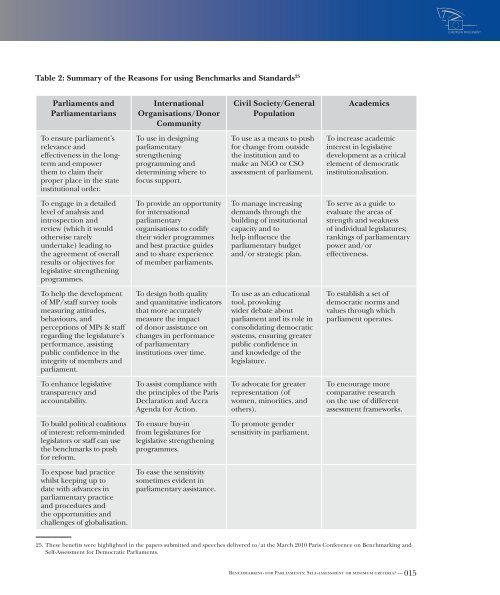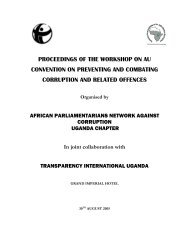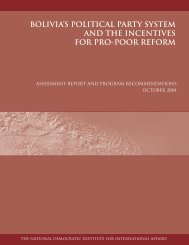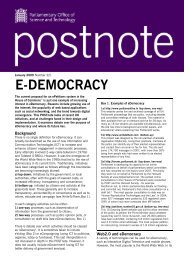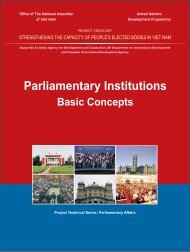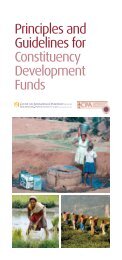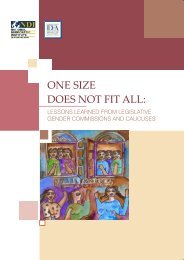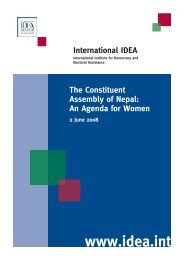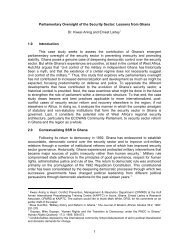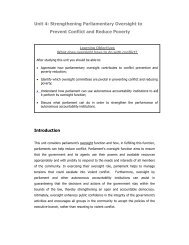BENCHMARKING FOR PARLIAMENTS
BENCHMARKING FOR PARLIAMENTS
BENCHMARKING FOR PARLIAMENTS
- No tags were found...
You also want an ePaper? Increase the reach of your titles
YUMPU automatically turns print PDFs into web optimized ePapers that Google loves.
Table 2: Summary of the Reasons for using Benchmarks and Standards 25Parliaments andParliamentariansInternationalOrganisations/DonorCommunityCivil Society/GeneralPopulationAcademicsTo ensure parliament’srelevance andeffectiveness in the longtermand empowerthem to claim theirproper place in the stateinstitutional order.To use in designingparliamentarystrengtheningprogramming anddetermining where tofocus support.To use as a means to pushfor change from outsidethe institution and tomake an NGO or CSOassessment of parliament.To increase academicinterest in legislativedevelopment as a criticalelement of democraticinstitutionalisation.To engage in a detailedlevel of analysis andintrospection andreview (which it wouldotherwise rarelyundertake) leading tothe agreement of overallresults or objectives forlegislative strengtheningprogrammes.To provide an opportunityfor internationalparliamentaryorganisations to codifytheir wider programmesand best practice guidesand to share experienceof member parliaments.To manage increasingdemands through thebuilding of institutionalcapacity and tohelp influence theparliamentary budgetand/or strategic plan.To serve as a guide toevaluate the areas ofstrength and weaknessof individual legislatures;rankings of parliamentarypower and/oreffectiveness.To help the developmentof MP/staff survey toolsmeasuring attitudes,behaviours, andperceptions of MPs & staffregarding the legislature’sperformance, assistingpublic confidence in theintegrity of members andparliament.To design both qualityand quantitative indicatorsthat more accuratelymeasure the impactof donor assistance onchanges in performanceof parliamentaryinstitutions over time.To use as an educationaltool, provokingwider debate aboutparliament and its role inconsolidating democraticsystems, ensuring greaterpublic confidence inand knowledge of thelegislature.To establish a set ofdemocratic norms andvalues through whichparliament operates.To enhance legislativetransparency andaccountability.To assist compliance withthe principles of the ParisDeclaration and AccraAgenda for Action.To advocate for greaterrepresentation (ofwomen, minorities, andothers).To encourage morecomparative researchon the use of differentassessment frameworks.To build political coalitionsof interest: reform-mindedlegislators or staff can usethe benchmarks to pushfor reform.To ensure buy-infrom legislatures forlegislative strengtheningprogrammes.To promote gendersensitivity in parliament.To expose bad practicewhilst keeping up todate with advances inparliamentary practiceand procedures andthe opportunities andchallenges of globalisation.To ease the sensitivitysometimes evident inparliamentary assistance.25. These benefits were highlighted in the papers submitted and speeches delivered to/at the March 2010 Paris Conference on Benchmarking andSelf-Assessment for Democratic Parliaments.Benchmarking for Parliaments: Self-assessment or minimum criteria? — 015


